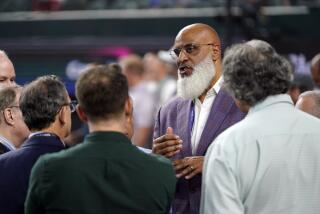Today, It’s Play Stalled, Not Play Ball : Talks: Players reject Vincent’s three-part proposal. Both sides say they aren’t close to new agreement as spring training lockout looms.
- Share via
NEW YORK — The players union dismissed Commissioner Fay Vincent’s proposal at the stalled baseball talks as a step backward Wednesday, ruining hopes of a breakthrough on the eve of a spring training lockout by owners.
“It’s not progress,” said Phil Bradley, one of the players attending a strategy session at the union office.
Thus, camps will not open as scheduled today, when pitchers, catchers and injured players were to start reporting in Florida and Arizona. Negotiations resume this morning in New York, but the two sides say they aren’t close to a new collective bargaining agreement.
Union chief Donald Fehr spoke negatively of Vincent’s proposal, which had raised hopes the day before. Fehr, who did not reject the plan outright, said it had three components:
--A system of minimum salaries for players with less than three years in the majors and a 75% cap on increases in salary arbitration.
--A two-year study committee on revenue sharing and a provision that the four-year labor agreement could be reopened by management after two years.
--No increase in the benefit plan covering health care costs and player pensions.
Vincent presented his plan during meetings Monday and Tuesday as a replacement for the owners’ revenue sharing and pay-for-performance proposals.
“It’s a change of approach, but not something we would seriously consider,” Paul Molitor of Milwaukee said.
Fehr, using the phrase of union lawyer Gene Orza, said Vincent’s proposal was progress only because “we’re now talking in the same ocean.”
Under Vincent’s plan, players with less than one year in the majors would have a $75,000 minimum salary, players with less than two years a $125,000 minimum, and players with less than three years a $200,000 minimum.
Fehr said he believed the minimums would become club-imposed standards. If that were true, three-plus players would have a $350,000 limit, four-plus players a $612,500 limit and five-plus players a top of $1,071,875.
“We have fought the battle on salary caps before,” said Fehr, who called the new proposal a request for givebacks.
In 1980 and 1985, owners proposed 100% caps on raises for players in salary arbitration and each time withdrew the proposal after stiff opposition from the players.
Last year, the average increase for players who filed for arbitration was 70%. Some players receive increases way above the average. San Diego catcher Benito Santiago got a 262% increase Wednesday and Angel pitcher Bob McClure last month settled his case with a 313% increase.
Vincent said that he preferred not to talk about his plan other than at the negotiations.
“It seems to me I am better off talking at the table,” he said Wednesday.
Orza attacked the proposal as “regressive.” Orza said he interpreted it as management saying, “We’re making more so we will give you less.”
Management negotiator Chuck O’Connor, speaking later at baseball’s executive offices, declined to get into the specifics of the proposal. But he said the option to terminate after two years was meant to protect teams from an economic downturn in baseball.
“(It) is an attempt to insulate the clubs from problems that will come to pass before four years,” O’Connor said. “In other words, to give them an out.”
O’Connor, who had a conference call Wednesday with the six owners on the Player Relations Committee, said that while the revenue-sharing proposal was being put aside for now, owners still saw it as the future of baseball’s labor-management relations.
“The objective is to very much get into that mode,” he said.
More to Read
Go beyond the scoreboard
Get the latest on L.A.'s teams in the daily Sports Report newsletter.
You may occasionally receive promotional content from the Los Angeles Times.










